Berta Cáceres assassination: ex-head of dam company found guilty, Roberto David Castillo, former Honduran army intelligence officer, found to be co-collaborator in ordering murder by Nina Lakhani, 5 Jul 2021, The Guardian
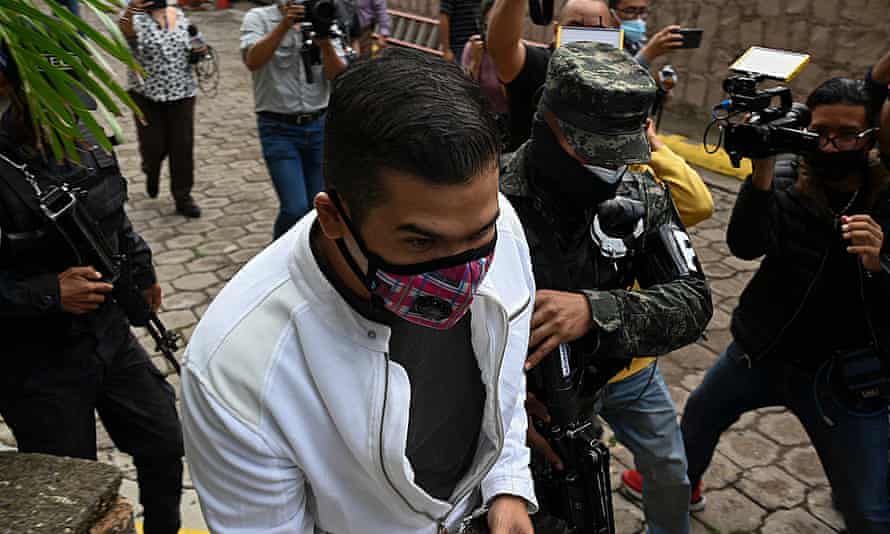
A US-trained former Honduran army intelligence officer who was the president of an internationally financed hydroelectric company has been found guilty over the assassination of the indigenous environmentalist Berta Cáceres.
Cáceres, winner of the Goldman prize for environmental defenders, was shot dead two days before her 45th birthday by hired hitmen on 2 March 2016 after years of threats linked to her opposition of the 22-megawatt Agua Zarca dam.
On Monday, Roberto David Castillo – the former head of the dam company Desarrollos Energéticos, or Desa – was found guilty of being co-collaborator in ordering the murder.
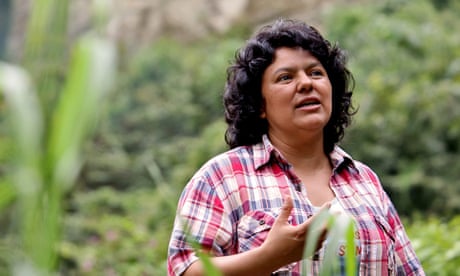
The high court in Tegucigalpa ruled that Cáceres was murdered for leading the campaign to stop construction of the dam, which led to delays and financial losses for the dam company.
The environmentally destructive energy project on the Gualcarque river, considered sacred by the Lenca people, was sanctioned even though it had not complied with national and international environmental and community requirements.
After a trial that lasted 49 days, the high court in Tegucigalpa ruled that Castillo used paid informants as well as his military contacts and skills to monitor Cáceres over years, information which was fed back to the company executives. He coordinated, planned and obtained the money to pay for the assassination of the internationally acclaimed leader, which was carried out by seven men convicted in December 2018.
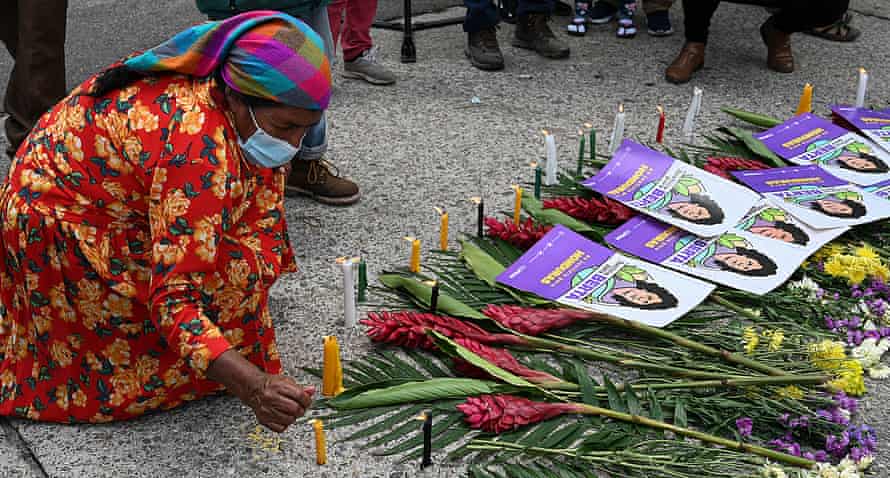
In the verdict, the court highlighted the communication between Castillo and Douglas Bustillo, Desa’s former security chief and fellow ex-army officer, before and after the murder, as well as before and after a failed assassination attempt the previous month.
The two men were clearly discussing the plans, logistics and payment for the crime, the court ruled.
Castillo’s defence had claimed that he was friends with Cáceres. But the court rejected this claim, ruling that phone data proved Castillo maintained contact with Cáceres only to obtain information about her whereabouts and intentions.
The verdict was welcomed by Cáceres’s family, friends and colleagues as an important step in their struggle to hold to account all those who had a role in ordering, financing and enabling the murder – as well as in the attempted cover-up that followed.
Outside court, Laura Zúñiga Cáceres, Berta’s youngest daughter and the only family member allowed to attend the trial, said: “Today is a day of victory in a long process. This is one more step on that long path to justice. We will keep contributing to this process so that [such crimes] are not repeated, but also so that the judicial process can lead to healing.
“This is a collective victory, and my message to other communities in similar situations is this: the fight is hard, but in the end, as my mom said, that we are going to triumph and we are going to dismantle the violence against our people.”
Cáceres’s eldest daughter welcomed the verdict on social media.
Cáceres was best known for her leadership in the Agua Zarca struggle, but she was also a sharp political analyst, LGBTQ+ rights campaigner and human rights defender who had long frustrated the country’s economic and political elites with her ability to unite disparate sectors against the corrupt status quo.
After the 2009 coup, which established a new level of institutionalised corruption, Cáceres repeatedly denounced the killing and criminalisation of community leaders, which she said amounted to a policy of social cleansing.
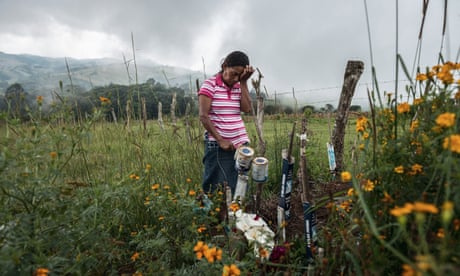
Lawyers representing Cáceres’s four children and mother, who prosecuted the case alongside the state, argued that the murder was the grand finale in a campaign of terror carried out by a wider criminal structure including company executives and state officials against Cáceres and her grassroots organisation Copinh (the Council of Popular and Indigenous Organisations of Honduras).
Daniel Atala Midence, Desa’s financial manager, was summoned to give evidence due to his role in running operations with Castillo – which included authorising payments to informants used to monitor Cáceres.
In one of the most dramatic moments of the trial, Atala Midence was excused at the last minute after state prosecutors confirmed that he remained under investigation for the murder, despite never having been interviewed or detained.
Atala Midence’s father and two uncles, the Atala Zablah brothers, who are part of one of the country’s most powerful economic and political clans, are the majority shareholders in the dam company. There is no suggestion they were involved in criminal activity.
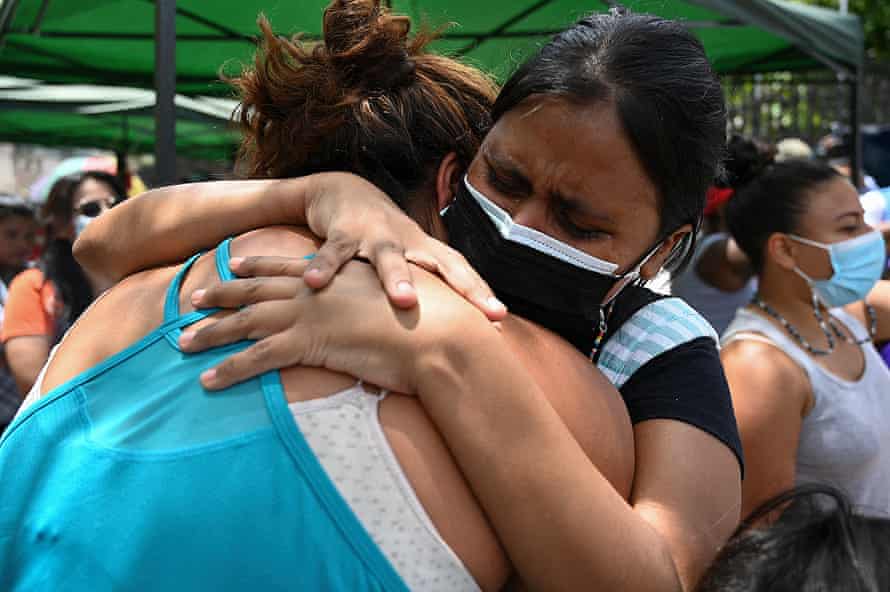
Victor Fernández, one of the Cáceres family’s lawyers, said the verdict demonstrated the magnitude of the struggle by Cáceres and the Lenca community in the face of a corrupt state which sold off their territory without consent. “Their audacity, determination and dignity to resist, defend and triumph over this corrupt system sets a precedent. We have nothing to thank the justice system for. It was they who persecuted Berta; they criminalised her and displaced her. This victory is a result of our militancy.”
Jose Felipe Gámez, a Copinh leader, said: “This is a very important guilty verdict for us as it contributes to our search for justice against the intellectual authors of the crime. It underlines the struggle we Indigenous communities face in Honduras where the government continues to authorise concessions for megaprojects in our territories.”
Castillo’s defence mostly focused on arguing that evidence had been manipulated by expert witnesses, and that alternative leads related to other threats Cáceres had suffered were ignored by prosecutors. The judges ruled that the defence had failed to substantiate these arguments.
Desa has been contacted for comment.
Castillo will be sentenced on 4 August.
- Nina Lakhani is author of Who Killed Berta Cáceres? Dams, Death Squads, and an Indigenous Defender’s Battle for the Planet
A firm step in the search for justice in the crime of Berta Cáceres
By unanimous vote, the judges of Chamber I of the Sentencing Court declared Roberto David Castillo, former manager of the company Desarrollos Energéticos S.A. (DESA), guilty of co-perpetration of the murder of Berta Cáceres, coordinator of the Civic Council of Popular and Indigenous Organizations of Honduras (COPINH).
The judges indicated in their ruling that “it was proven that Roberto David Castillo had control of the act”, that is to say that he participated in the organization, logistics, monitoring and surveillance to assassinate Berta Cáceres.
The Court recognized, after the analysis of more than 100 pieces of evidence presented by the Prosecutor’s Office and the private prosecution, that the murder of Berta Cáceres was planned and executed in a context of resistance, led by Cáceres, to the hydroelectric project “Agua Zarca” on the Gualcarque River.
According to the ruling, the phone records show that the DESA company, which was headed by Roberto David Castillo, paid for services to be informed of Berta Cáceres’ movements. Castillo’s connection was evidenced in the expert analysis of the WhatsApp group “Security-Peace”, in which he coordinated actions with Douglas Geovanny Bustillo, liaison with the assassination group that killed the COPINH coordinator on March 2, 2016.
In that sense, lawyer Lester Castro, member of the legal team of the Berta Cáceres Case, commented that “we are satisfied with the decision, there could not be a different resolution, there is a lot of evidence that links him”.
Castro adds that the challenge remains to “pursue the other people who are linked to the murder, the owners or partners of the DESA company, who are the Atala-Zablah family”. During the course of the trial, wiretaps were made public in which Roberto David Castillo informed Jacobo Atala, partner of the DESA company, of the capture of Sergio Rodríguez, one of the perpetrators of the crime.
In the audios, Jacobo Atala can be heard telling Roberto David Castillo: “It can’t be, and that’s bullshit! Now they’ve really sunk us”.
For Isabel Albaladejo, representative of the Office of the United Nations High Commissioner for Human Rights in Honduras (OHCHR), the ruling against Roberto David Castillo is historic and represents the triumph of justice over impunity.
“This sets a precedent in terms of justice, that those materially and intellectually responsible for these serious human rights violations can be convicted. In addition, I believe that the sentence, which has been very well motivated, already raises some elements of what could be the intellectual responsibility of other possible perpetrators,” said Albaladejo. …
Un paso firme en búsqueda de justicia en el crimen de Berta Cáceres
05/07/2021 Aplicación Móvil Noticias Nacionales Portada Radio Progreso HN

Por unanimidad de votos, los jueces de la Sala I del Tribunal de Sentencia declararon a Roberto David Castillo, ex gerente de la empresa Desarrollos Energéticos S.A (DESA), culpable de la coautoría del asesinato de Berta Cáceres, coordinadora del Consejo Cívico de Organizaciones Populares e Indígenas de Honduras (COPINH).
Los jueces indicaron en su fallo que “quedó acreditado que Roberto David Castillo tenía dominio del hecho”, es decir que participó en la organización, logística, seguimiento y vigilancia para asesinar a Berta Cáceres.
El Tribunal reconoció, tras el análisis de más de 100 medios probatorios presentados por la Fiscalía y la acusación privada, que el asesinato de Berta Cáceres se planificó y ejecutó en un contexto de resistencia, liderado por Cáceres, al proyecto hidroeléctrico “Agua Zarca” sobre el Río Gualcarque.
De acuerdo al fallo, los vaciados telefónicos dan cuenta que la empresa DESA, la cual dirigía Roberto David Castillo, pagó servicios para informarse de los movimientos que realizaba Berta Cáceres. La conexión de Castillo quedó evidenciada en el peritaje al grupo de WhatsApp “Seguridad-Paz”, en el cual coordinaba acciones con Douglas Geovanny Bustillo, enlace con el grupo sicarial que asesinó a la coordinadora del COPINH, el 2 de marzo de 2016.
En ese sentido, el abogado Lester Castro, integrante del equipo legal del Caso Berta Cáceres, comentó que “estamos satisfechos con la decisión, no podía existir una resolución distinta, existe mucha prueba que lo vincula”.
Castro agrega que queda el desafío de “perseguir a las otras personas que están vinculadas con el asesinato, los dueños o socios de la empresa DESA que son los Atala-Zablah”. Durante el desarrollo del juicio se conocieron escuchas telefónicas en las que Roberto David Castillo informaba a Jacobo Atala, socio de la empresa DESA, la captura de Sergio Rodríguez, uno de los autores materiales del crimen.
En los audios se escucha a Jacobo Atala decirle a Roberto David Castillo: “No puede ser, y ese cagadal. Ahora sí nos hundieron del todo».

Para Isabel Albaladejo, representante de la Oficina del Alto Comisionado de las Naciones Unidas para los Derechos Humanos en Honduras (OACNUDH), el fallo contra Roberto David Castillo es histórico y representa el triunfo de la justicia por encima de la impunidad.
“Esto sienta un precedente en términos de justicia, de que se pueden condenar a los responsables materiales e intelectuales de estás graves violaciones a los derechos humanos. Además, creo que la sentencia, que ha estado muy bien motivada, ya plantea algunos elementos de lo que podría ser la responsabilidad intelectual de otros posibles autores”, indicó Albaladejo.
Faltan los Atala
Pese al fallo de culpabilidad contra Roberto David Castillo, el camino de justicia por el asesinato de Berta Cáceres sigue hasta llegar a los autores intelectuales, manifiesta Bertha Zúniga Cáceres, coordinadora del COPINH: “siempre hemos dicho que David Castillo es el eslabón más bajo de una estructura superior que cometió y participó en este crimen”.
Bertha Zúniga comenta que el fallo deberá abrir el camino para llegar a otras estructuras institucionales y deducirles responsabilidades por tráfico de influencias al entregar la concesión del Río Gualcarque en contra de la voluntad de la comunidad.
Por su parte, Laura Zúniga Cáceres, hija de Berta Cáceres, interpreta que el fallo contra Castillo reconoce cuál fue el móvil del asesinato “y eso es su lucha por el Río Gualcarque”.
“Sabemos que los más interesados en frenar esta lucha eran la familia Atala-Zablah, los hemos venido denunciando, entendemos que se tiene que abrir proceso contra ellos, y vamos a ir en ese camino”, expresa Laura Zúniga.
El portavoz del Ministerio Público, Yuri Mora, aseguró a los medios de comunicación que la investigación por el asesinato de Berta Cáceres sigue abierta: “los fiscales continúan llevando acabo otras investigaciones, porque no podemos descartar que puedan haber más autores intelectuales”.
Doña Austra Bertha, mamá de Berta Cáceres, en una comunicación telefónica, al conocer el fallo de culpabilidad, hizo un llamado a la comunidad nacional e internacional para que les acompañe “a continuar en esta lucha hasta llegar al último que inventó ese vil asesinato”.

“Hasta que acampe la justicia”
Mientras se realizaban las audiencias del juicio contra Roberto David Castillo, en las afueras de la Corte Suprema de Justicia se levantó el Campamento Feminista Viva Berta, en el cual se realizaron actividades colectivas para el acompañamiento en la exigencia de justicia por el feminicidio de Berta Cáceres.
“El campamento ha sido el espacio de muchos encuentros; un sitio donde se comprobó si es que de verdad estamos dispuestas y atentos a vivir otro país posible donde estemos cerca y conocernos con respeto y diálogo”, manifestaron la Red Nacional de Defensoras de Derechos Humanos, la Organización Fraternal Negra de Honduras (OFRANEH) y el Consejo Cívico de Organizaciones Populares e Indígenas de Honduras (COPINH), organizaciones que coordinaron el Campamento.
Yessica Trinidad, coordinadora de la Red Nacional de Defensoras, dice que el Campamento Feminista Viva Berta ha significado una lucha ardua, de resistencia y de terquedad, pero también muchas alegrías. “Cerramos –el Campamento- con la certeza que se va a mover a otras comunidades/territorios que exigen justicia por Berta y por todas las defensoras criminalizadas y perseguidas por este sistema capitalista, racista y patriarcal”, afirma Trinidad.
En representación de la OFRANEH, Selvin López expresó que el fallo de culpabilidad y el Campamento Viva Berta es una similla que se siembra “para que el día de mañana podamos cosecharlo para nuestros hijos. Hoy se empieza un paso de los muchos que faltan”.
El área verde, donde se levantó por 90 días el Campamento Feminista Viva Berta, ahora pasará a ser un lugar de encuentros de los pueblos y comunidades que están en resistencia a los proyectos de despejo territorial y de los bienes naturales y comunes.
“Aunque se levanten las tiendas de campaña, queda aquí la fuerza de los pueblos, queda el pensamiento y la lucha de Berta, y este espacio lo hemos nombrado como un espacio de lucha y resistencia”, comentó Yessica Trinidad, luego de develar una placa con el rostro de Berta Cáceres en medio del Campamento Feminista Viva Berta.

Honduran Jesuit: Conviction in Cáceres murder breaks ‘tradition of impunity’ by Catholic News Service, July 6, 2021
Roberto David Castillo, a former executive with Desarrollos Energéticos, is arrested in Tegucigalpa, Honduras, March 2, 2018. On July 5, 2021, a court convicted Castillo of being a co-collaborator in the 2016 murder of Berta Cáceres, environmental leader and Indigenous rights advocate. (CNS photo/Jorge Cabrera, Reuters)
Mexico City — A court in the Honduran capital of Tegucigalpa ruled that Roberto David Castillo, a former executive with Desarrollos Energéticos, was a co-collaborator in the the 2016 murder of Berta Cáceres, environmental leader and Indigenous rights advocate.
Cáceres led opposition to a dam being built on the Gualcarque River, which was considered important to her Lenca people. Castillo’s company was building the dam. Cáceres was murdered in her home in western Honduras.
Seven individuals had been convicted of participating in the attack on Cáceres. Castillo was initially accused of being the mastermind of the murder, but the court convicted him of being a co-collaborator.
“This is a popular victory for the Honduran people. It means the criminal power structures were unable to corrupt the justice system,” COPINH, the Indigenous rights organization Cáceres founded, tweeted July 5.
Cáceres was well-known in Honduras for leading opposition to deforestation and hydroelectric projects, which threatened to displace poor and rural populations. In 2015 she won the Goldman Prize, an award considered the Nobel Prize for ecological actions.
Jesuit Fr. Ismael Moreno Coto, who knew Cáceres, said the court decision “breaks a very long tradition … a permanent tradition of impunity.”
Moreno, director of Radio Progreso, credited “international pressure,” along with intense social pressure in Honduras, for achieving the conviction.
“If there is pressure to get to these high levels (of society), then one can believe that the wall of impunity is falling,” Moreno said July 6. “This trial tells us that those who are ‘untouchable,’ who have always bought justice, are starting to be touched.”
It was a rare case of justice in a country notorious for impunity and where they slayings of people protesting ecological issues and land dispossessions often go unpunished.
Global Witness, a human rights organization, reported in March on the fifth anniversary of Cáceres’ murder, “at least 40 land and environmental defenders have been murdered in Honduras since Berta’s death.”

Refer also to:
Berta Cáceres: Murdered for activism in Honduras, Energy Company Under Investigation

